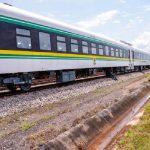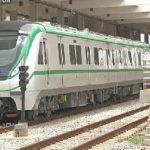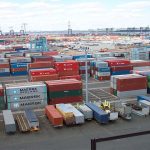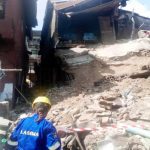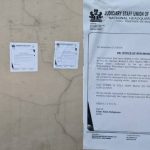Transnet, the South African freight rail operator, announced late on Thursday that partial service will resume on the line linking to the country’s main coal export terminal, four days after two trains crashed and jammed the rails.
The first line heading to the Richards Bay coal terminal was declared safe for rail traffic on Thursday night, Transnet said in a statement, adding that service on the second line is anticipated to start on Saturday.
The two lines have been out of service after two trains collided, hitting mineral shipments already constrained by locomotive shortages as well as rampant cable theft and vandalism of infrastructure.
Miners have long struggled with Transnet’s limited capacity to transport commodities to ports due to equipment shortages and maintenance backlogs caused by decades of underinvestment.
Some enterprises, including Thungela and Africa’s largest iron ore exporter Kumba Iron Ore (KIOJ.J) (opens new tab), have been compelled to reduce production to match Transnet’s limited ability to transport goods to ports.
A few miners have been transporting coal to the port by road, which is more expensive and environmentally damaging than rail, but Transnet, which also operates South Africa’s ports, announced curbs on trucks entering Richards Bay in November, citing “unprecedented congestion” on the coastal town’s roads.
Transnet, the South African freight rail operator, announced late on Thursday that partial service will resume on the line linking to the country’s main coal export terminal, four days after two trains crashed and jammed the rails.
The first line heading to the Richards Bay coal terminal was declared safe for rail traffic on Thursday night, Transnet said in a statement, adding that service on the second line is anticipated to start on Saturday.
The two lines have been out of service after two trains collided, hitting mineral shipments already constrained by locomotive shortages as well as rampant cable theft and vandalism of infrastructure.
Miners have long struggled with Transnet’s limited capacity to transport commodities to ports due to equipment shortages and maintenance backlogs caused by decades of underinvestment.
Some enterprises, including Thungela and Africa’s largest iron ore exporter Kumba Iron Ore (KIOJ.J) (opens new tab), have been compelled to reduce production to match Transnet’s limited ability to transport goods to ports.
A few miners have been transporting coal to the port by road, which is more expensive and environmentally damaging than rail, but Transnet, which also operates South Africa’s ports, announced curbs on trucks entering Richards Bay in November, citing “unprecedented congestion” on the coastal town’s roads.
Transnet, the South African freight rail operator, announced late on Thursday that partial service will resume on the line linking to the country’s main coal export terminal, four days after two trains crashed and jammed the rails.
The first line heading to the Richards Bay coal terminal was declared safe for rail traffic on Thursday night, Transnet said in a statement, adding that service on the second line is anticipated to start on Saturday.
The two lines have been out of service after two trains collided, hitting mineral shipments already constrained by locomotive shortages as well as rampant cable theft and vandalism of infrastructure.
Miners have long struggled with Transnet’s limited capacity to transport commodities to ports due to equipment shortages and maintenance backlogs caused by decades of underinvestment.
Some enterprises, including Thungela and Africa’s largest iron ore exporter Kumba Iron Ore (KIOJ.J) (opens new tab), have been compelled to reduce production to match Transnet’s limited ability to transport goods to ports.
A few miners have been transporting coal to the port by road, which is more expensive and environmentally damaging than rail, but Transnet, which also operates South Africa’s ports, announced curbs on trucks entering Richards Bay in November, citing “unprecedented congestion” on the coastal town’s roads.
Transnet, the South African freight rail operator, announced late on Thursday that partial service will resume on the line linking to the country’s main coal export terminal, four days after two trains crashed and jammed the rails.
The first line heading to the Richards Bay coal terminal was declared safe for rail traffic on Thursday night, Transnet said in a statement, adding that service on the second line is anticipated to start on Saturday.
The two lines have been out of service after two trains collided, hitting mineral shipments already constrained by locomotive shortages as well as rampant cable theft and vandalism of infrastructure.
Miners have long struggled with Transnet’s limited capacity to transport commodities to ports due to equipment shortages and maintenance backlogs caused by decades of underinvestment.
Some enterprises, including Thungela and Africa’s largest iron ore exporter Kumba Iron Ore (KIOJ.J) (opens new tab), have been compelled to reduce production to match Transnet’s limited ability to transport goods to ports.
A few miners have been transporting coal to the port by road, which is more expensive and environmentally damaging than rail, but Transnet, which also operates South Africa’s ports, announced curbs on trucks entering Richards Bay in November, citing “unprecedented congestion” on the coastal town’s roads.
Transnet, the South African freight rail operator, announced late on Thursday that partial service will resume on the line linking to the country’s main coal export terminal, four days after two trains crashed and jammed the rails.
The first line heading to the Richards Bay coal terminal was declared safe for rail traffic on Thursday night, Transnet said in a statement, adding that service on the second line is anticipated to start on Saturday.
The two lines have been out of service after two trains collided, hitting mineral shipments already constrained by locomotive shortages as well as rampant cable theft and vandalism of infrastructure.
Miners have long struggled with Transnet’s limited capacity to transport commodities to ports due to equipment shortages and maintenance backlogs caused by decades of underinvestment.
Some enterprises, including Thungela and Africa’s largest iron ore exporter Kumba Iron Ore (KIOJ.J) (opens new tab), have been compelled to reduce production to match Transnet’s limited ability to transport goods to ports.
A few miners have been transporting coal to the port by road, which is more expensive and environmentally damaging than rail, but Transnet, which also operates South Africa’s ports, announced curbs on trucks entering Richards Bay in November, citing “unprecedented congestion” on the coastal town’s roads.
Transnet, the South African freight rail operator, announced late on Thursday that partial service will resume on the line linking to the country’s main coal export terminal, four days after two trains crashed and jammed the rails.
The first line heading to the Richards Bay coal terminal was declared safe for rail traffic on Thursday night, Transnet said in a statement, adding that service on the second line is anticipated to start on Saturday.
The two lines have been out of service after two trains collided, hitting mineral shipments already constrained by locomotive shortages as well as rampant cable theft and vandalism of infrastructure.
Miners have long struggled with Transnet’s limited capacity to transport commodities to ports due to equipment shortages and maintenance backlogs caused by decades of underinvestment.
Some enterprises, including Thungela and Africa’s largest iron ore exporter Kumba Iron Ore (KIOJ.J) (opens new tab), have been compelled to reduce production to match Transnet’s limited ability to transport goods to ports.
A few miners have been transporting coal to the port by road, which is more expensive and environmentally damaging than rail, but Transnet, which also operates South Africa’s ports, announced curbs on trucks entering Richards Bay in November, citing “unprecedented congestion” on the coastal town’s roads.
Transnet, the South African freight rail operator, announced late on Thursday that partial service will resume on the line linking to the country’s main coal export terminal, four days after two trains crashed and jammed the rails.
The first line heading to the Richards Bay coal terminal was declared safe for rail traffic on Thursday night, Transnet said in a statement, adding that service on the second line is anticipated to start on Saturday.
The two lines have been out of service after two trains collided, hitting mineral shipments already constrained by locomotive shortages as well as rampant cable theft and vandalism of infrastructure.
Miners have long struggled with Transnet’s limited capacity to transport commodities to ports due to equipment shortages and maintenance backlogs caused by decades of underinvestment.
Some enterprises, including Thungela and Africa’s largest iron ore exporter Kumba Iron Ore (KIOJ.J) (opens new tab), have been compelled to reduce production to match Transnet’s limited ability to transport goods to ports.
A few miners have been transporting coal to the port by road, which is more expensive and environmentally damaging than rail, but Transnet, which also operates South Africa’s ports, announced curbs on trucks entering Richards Bay in November, citing “unprecedented congestion” on the coastal town’s roads.
Transnet, the South African freight rail operator, announced late on Thursday that partial service will resume on the line linking to the country’s main coal export terminal, four days after two trains crashed and jammed the rails.
The first line heading to the Richards Bay coal terminal was declared safe for rail traffic on Thursday night, Transnet said in a statement, adding that service on the second line is anticipated to start on Saturday.
The two lines have been out of service after two trains collided, hitting mineral shipments already constrained by locomotive shortages as well as rampant cable theft and vandalism of infrastructure.
Miners have long struggled with Transnet’s limited capacity to transport commodities to ports due to equipment shortages and maintenance backlogs caused by decades of underinvestment.
Some enterprises, including Thungela and Africa’s largest iron ore exporter Kumba Iron Ore (KIOJ.J) (opens new tab), have been compelled to reduce production to match Transnet’s limited ability to transport goods to ports.
A few miners have been transporting coal to the port by road, which is more expensive and environmentally damaging than rail, but Transnet, which also operates South Africa’s ports, announced curbs on trucks entering Richards Bay in November, citing “unprecedented congestion” on the coastal town’s roads.




